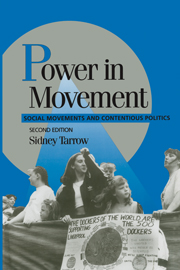Book contents
- Frontmatter
- Contents
- List of Figures
- Preface
- Acknowledgments
- Introduction
- 1 Contentious Politics and Social Movements
- PART 1 THE BIRTH OF THE MODERN SOCIAL MOVEMENT
- 2 Modular Collective Action
- 3 Print and Association
- 4 State Building and Social Movements
- PART II FROM CONTENTION TO SOCIAL MOVEMENTS
- PART III THE DYNAMICS OF MOVEMENT
- Conclusion: The Future of Social Movements
- Notes
- Sources
- Index
- CAMBRIDGE STUDIES IN COMPARATIVE POLITICS
4 - State Building and Social Movements
Published online by Cambridge University Press: 05 June 2012
- Frontmatter
- Contents
- List of Figures
- Preface
- Acknowledgments
- Introduction
- 1 Contentious Politics and Social Movements
- PART 1 THE BIRTH OF THE MODERN SOCIAL MOVEMENT
- 2 Modular Collective Action
- 3 Print and Association
- 4 State Building and Social Movements
- PART II FROM CONTENTION TO SOCIAL MOVEMENTS
- PART III THE DYNAMICS OF MOVEMENT
- Conclusion: The Future of Social Movements
- Notes
- Sources
- Index
- CAMBRIDGE STUDIES IN COMPARATIVE POLITICS
Summary
National states are so central a focus for the mobilization of opinion today that we often forget that this was not always so. During the centuries prior to absolutism in western Europe, national states worthy of the name could hardly be said to exist. “On the one hand,” writes Norbert Elias in State Formation and Civilization,
kings were forced to delegate power over part of their territory to other individuals. The state of military, economic and transport arrangements at that time left them no choice … On the other hand the vassals representing the central power were restrained by no oath of allegiance or loyalty from asserting the independence of their area as soon as the relative power positions of the central ruler and his delegates shifted in favour of the latter.
(1994: 276–7)In such a system, contention was constant, largely territorially based, and changed its contours according to whether the monarch was temporarily ascendant or suffering a crisis.
From roughly the fifteenth century on, this pattern began to give way, as the expansion of a money economy gave kings the power to hire mercenary soldiers, build roads on which to deploy them, and hire civil servants to collect taxes, administer rules, and overcome provincial nobles. Where they could establish a rough balance between the aristocracy and the rising burghers of the towns, they developed a “royal mechanism,” which led to the formation of absolutist states – as in France (Elias 1994: ch. 2).
- Type
- Chapter
- Information
- Power in MovementSocial Movements and Contentious Politics, pp. 54 - 68Publisher: Cambridge University PressPrint publication year: 1998



